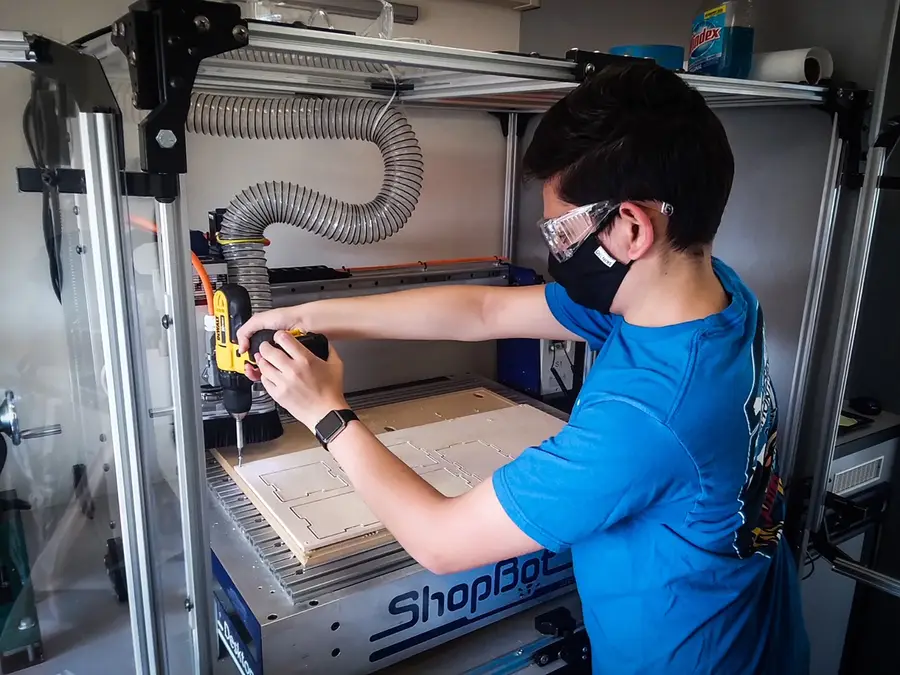Teaming up with the U.S. Department of Defense to deliver STEM education
Objective
To create a diverse and sustainable science, technology, engineering, and math (STEM) talent pool ready to serve our nation and extend the U.S. Department of Defense’s (DoD’s) competitive edge.
Approach
Serving students who are military-connected and underrepresented in STEM by creating a consortium of partners that can leverage the network as force multipliers and evolve the approach based on data.
Impact
The Defense STEM Education Consortium (DSEC) served 208,115 students and 8,858 educators in the first three years of the partnership.
DoD is the largest employer of STEM workers in the federal space, depending on more than 300,000 scientists and engineers across the Defense Laboratory Enterprise to meet national defense challenges and modernization priorities. U.S. officials recognize that the current pipeline of future leaders in these fields will not support future workforce needs.
To combat this shortage, the DoD partnered with RTI International and other organizations to create DSEC.
What is DSEC?
DSEC is a collaborative partnership among academia, industry, non-profit organizations, and government that aims to broaden STEM literacy and develop a diverse and agile future workforce to power the nation’s innovative defense infrastructure. As the lead organization of DSEC, RTI is helping to drive that effort by managing the consortium of organizations that directly and indirectly support students, teachers, and communities. Five fundamental principles guide the work of the consortium:
- Engage students and educators in meaningful STEM experiences.
- Serve students who are military-connected and underrepresented in STEM.
- Connect to the DoD STEM workforce.
- Leverage the network as a force multiplier.
- Evolve the data-based approach.
RTI is overseeing the implementation and efficiency of DSEC by streamlining business processes, providing thought leadership on how to fuel the growth of STEM education in grades K through 20, and fostering collaboration among consortium members.

A student uses a power drill for a STEM-related project.
Bringing STEM to Students
DSEC is instrumental in furthering STEM education by amplifying the reach of individual programs and connecting them with new populations of students. It also creates pathways for students to connect their goals and coursework seamlessly as they transition through their K–12 and postsecondary experience. DSEC programming has reached students in all 50 states, the District of Columbia, Puerto Rico, the U.S. Virgin Islands, and Guam.
The following selected examples highlight DSEC outreach:
MATHCOUNTS provides middle school students opportunities to grow in mathematics through the National Math Club, Math Video Challenge, and MATHCOUNTS Competition Series. More than 20,000 students have been reached through the programs. Among MATHCOUNTS student participants, 82% reported that they planned to take more high school math than just the required courses, and 80% of all students reported an interest in pursuing a STEM-related career. MATHCOUNTS also provides support and outreach to new coaches and teachers working in low-income schools.
RoboNation’s SeaPerch Remotely Operated Vehicle program has reached nearly 3,400 students in three military-connected communities across the Gulf Coast region. RoboNation’s goals include reducing traditional barriers in robotics participation; introducing more students to engineering, design, and science concepts; and engaging more students in inquiry-based learning with real-world applications.
CompuGirls: Phoenix is a program developed by Mary Lou Fulton Teachers College at Arizona State University. This information technology curriculum is designed for girls from underrepresented communities with the goal of sparking interest in careers in computer science and/or cybersecurity. It includes a 5-week fall camp with mentors and guest speakers, a spring camp, and a virtual summer course that offers college credit.
Evolving to Create Opportunity in STEM
DSEC provides students with opportunities to use technology that they would not typically be able to access, while further developing their interest in STEM. DSEC continues to employ a data-driven approach to evaluate progress over time and ensure positive outcomes for students and educators. RTI’s approach also will continue to evolve to meet the needs of students and to ensure that the skills pipeline can meet the demands of tomorrow’s DoD workforce.
Through ongoing innovation, subject matter expertise, and a dynamic consortium membership, RTI is creating a foundation for the future of STEM education. Learn more about RTI’s education & workforce development and military research & solutions.
- U.S. Department of Defense (DoD)
- Alamo STEM Ecosystem
- American Institutes for Research
- Arizona State University, Mary Lou Fulton Teachers College
- Building Engineering and Science Talent (BEST)
- Bowie State University
- Center for Excellence in Education
- Cyber.org
- The Dayton Regional STEM Center
- FIRST
- Learning Undefeated
- Mathcounts
- Morgan State University
- National Center for Women and Information Technology
- National Math and Science Initiative
- Prince George's Community College
- RoboNation
- Robotics Education & Competition Foundation (REC Foundation)
- San Diego Miramar College
- Sinclair Community College
- Society for Science
- TGR Foundation
- TIES
- UC San Diego CREATE






